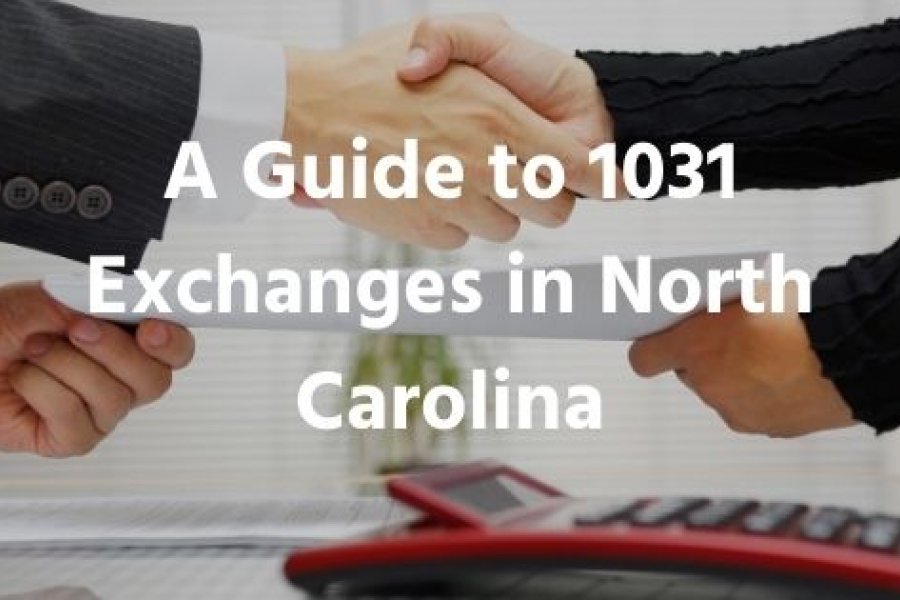
Did you know that you can defer capital gains taxes after swapping one investment for another in North Carolina? That’s right! Section 1031 of the Internal Revenue Service (IRS) makes that possible.
Before making an exchange, however, you must familiarize yourself with all the requirements of the 1031 rules. For example, you must make sure that the exchange is done with only “like-kind” properties. Also, you must strictly adhere to certain time frames.
Failure to follow the due process will render the exchange null and void. To avoid that, here is a guide to the 1031 exchanges in North Carolina.
What is a 1031 Exchange?
First and foremost, Section 1031 is contained in the Internal Revenue Service code. A 1031 exchange is a swap of one “like-kind” property for another. If you do a successful 1031 exchange, you’ll either have limited tax or no tax due at the time of the exchange.
Therefore, you can effectively change the form of your investment without cashing it out or capital gains being recognized. This will allow you to grow your investment on a tax-deferred basis.
According to Section 1031 of the IRS code, no limit exists on how frequently or how many 1031 exchanges you can do. You can rollover the gain from one investment to another an infinite number of times. You’ll only have to pay tax when you eventually cash out many years later.

As previously states, properties involved in 1031 exchanges must be “like-kind". “Like-kind” can take many relative meanings. You can, for instance, swap raw land for a strip mall. The rules tend to be surprisingly liberal. You may also be able to swap one business for another.
Here are some examples of like-kind exchanges:
- Industrial property exchanged for rental resort property
- Single-family rental exchanged for an apartment
- Duplex exchanged for commercial property
- Commercial building exchanged for vacant land
- Unimproved property exchanged for improved property
There is a caveat, though, when it comes to what is considered “like-kind”. “Like-kind” is only meant for investment or business property. The following properties don’t qualify for a 1031 exchange:
- Certificates of trust
- Partnership interests
- Other securities or debt
- Stocks, bonds, or notes
- Inventory or stock in trade
What are the Timing Rules?
1031 exchanges are for “like-kind” properties. But, the chances of finding someone with the same kind of property can be difficult. For this reason, many of the exchanges get delayed.
In a delayed 1031 exchange, you’ll need to find a qualified intermediary who will hold up the cash after you “sell” it. A qualified intermediary is a person who holds funds from a relinquished property and uses them to acquire a replacement property.

In the 3-party exchange, two timing rules must be observed:
- 45-Day Rule. Once you “sell” your North Carolina property, you must transfer the funds to a qualified intermediary. Even though you’re “selling” the property, you can’t receive the cash. If you do, the 1031 exchange will get spoilt. Also, within 45 days after the “sale” of your property, you have to designate the replacement property to the intermediary. This must be done in writing.
- 180-Day Rule. The closing must be done within 180 days after the relinquished property is sold. Please note that the 45-Day Rule and the 180-Day Rules run concurrently. In other words, you start counting the moment you close on the relinquished property.
Do Vacation Homes Qualify?
Yes, they do! You can turn your vacation home into a rental property and carry out a 1031 exchange. For instance, you can rent out your beach house for 6 months or a year, and then swap it for another property.
Your goal here would be to ensure you conduct yourself in a businesslike manner as a landlord.

Among other things, advertise your vacation rental, screen prospective tenants, and observe all laws governing vacation rentals. If you do such things, the 1031 exchange should be a success.
What Does “Boot” Refer to in a 1031 Exchange?
Boot occurs when 100% of the proceeds from a 1031 exchange aren’t invested in a replacement property.
Now suppose you “sell” your Raleigh property for $300,000. But for whatever reason, you only end up investing $230,000. In such a case, the difference of $70,000 would be considered “boot”.
To take advantage of a 1031 exchange in the deferment of capital gains, the cost of the replacement property must be equal to or exceed the cost of the relinquished property. Otherwise, any “gain” from a 1031 exchange will be considered boot. It should be noted that "boot" is taxable.
Besides a cash boot, the following are different factors that can create a boot:
- Exchanging properties that don’t meet the “like-kind” criteria.
- Taking exchange proceeds in the form of a note.
- Receipt of any cash during the settlement or closing of the replacement property.
- Taking cash proceeds from escrow before all funds have been sent to a qualified intermediary.

To avoid owing taxes on at least a portion of your sales proceeds, you’ll need to avoid boot. Here’s how you can do that:
- Reinvest all the net equity from the sale of the Relinquished Property in the purchase of the replacement property.
- Purchase “like-kind” replacement property with a value equal to or greater than the value of the relinquished property.
- Don’t over-finance the mortgage on the replacement property.
- Bring cash to closing to help pay for things that would otherwise not qualify as “like-kind”. Rent prorations, tenant deposits, or any vendor invoices are some examples.
Summary
As a savvy investor, taking advantage of 1031 exchanges to defer capital gains taxes is a no-brainer. Among other things, it can help you diversify assets and build wealth. That said, following the exchange rules is key.
Schambs Property Management can help you get the process right as well as assist you with any other aspects of property management you may need!